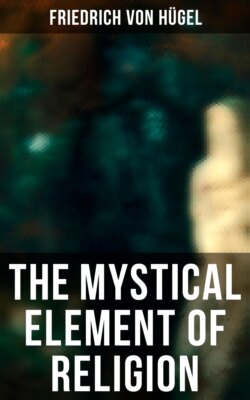Читать книгу The Mystical Element of Religion - Friedrich von Hügel - Страница 14
На сайте Литреса книга снята с продажи.
6. The dark, intuitive personalities and schools, apparently a mere stop-gap, transition, or reaction against the clear, discursive ones.
ОглавлениеAnd further, the personalities and schools of the interiorly experimental, emotional kind seem to appear upon the scene but as stop-gaps or compensations for the other series, in periods of transition or reaction, of uncertainty or decay. So at the break-up of the Roman Empire (Neo-Platonism); so at the end of the Patristic period and just before the official acceptance of Scholasticism (St. Bernard); so during the foundering of the Mediaeval fabric of life and thought in the Renaissance of the fifteenth and sixteenth centuries (Pico, Paracelsus); so in the German Romanticism of sixty years ago, as a reaction against the survivals of the eighteenth-century Rationalism; so now again in our own day, more slightly, but not less really, in a revival of spiritual philosophy. It looks then as though the experimental-emotional strain could only thrive fitfully, on the momentary check or ruin of the clear and “scientific” school; as though it were a perhaps inevitable disease breaking in occasionally upon the normal health of the human mind. For the eventual result of the world’s whole movement surely seems to be the reclamation of ever-increasing stretches of knowledge and theory from the dominion of vague, irresponsible, untestable feeling, and their incorporation in the domain of that unbroken, universal determinism, of those clear and simple, readily analyzable, verifiable, communicable, and applicable laws which, more and more, are found to rule phenomena wheresoever we may look.
